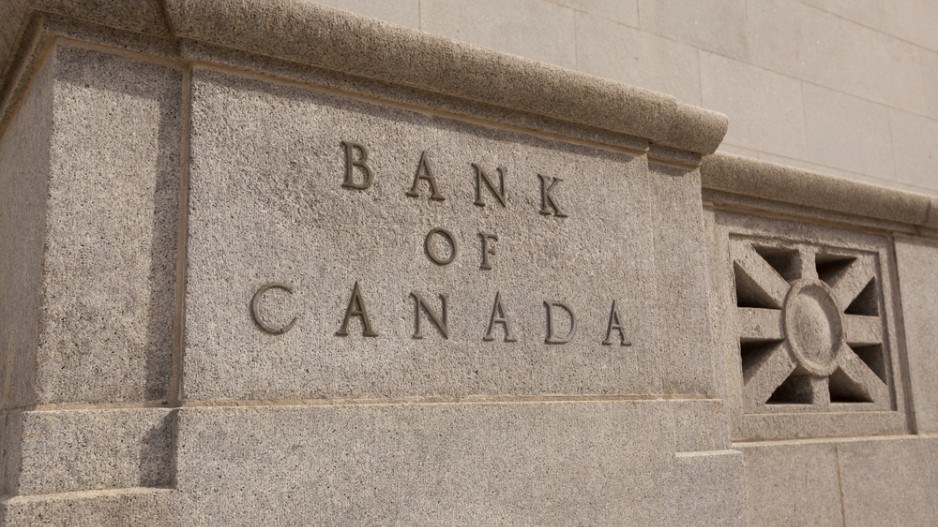For the first time in over four years, Canada’s central bank is changing its overnight rate target, to the surprise of many analysts and forecasters.
The Bank of Canada (BOC) announced January 21 that it is decreasing the rate to 0.75%, down 25 basis points, calling this a reaction to the recent sharp slump in oil prices.
“The oil price shock increases both downside risks to the inflation profile and financial stability risks,” the BOC said in a release.
“The bank’s policy action is intended to provide insurance against these risks, support the sectoral adjustment needed to strengthen investment and growth, and bring the Canadian economy back to full capacity and inflation to target within the projection horizon.”
Business Council of BC economist Jock Finlayson said while this move is not positive for Canada as a whole, there is a “slight net positive” for British Columbia.
“That will be good news for a lot of people in B.C. because of the high levels of household debt and the large mortgages that people carry on their balance sheets – unless you are a saver,” Finlayson said.
“If you are living off your savings, it’s a different picture.”
He cautions that even though this is good news for the province, he was quick to point out that the rate cut was based on bad news
“The decision has been taken because the global economic outlook has softened and the Canadian economic outlook has deteriorated, so one has to be careful using the term ‘good news,’” he said. “Having said that, the impact of the decision itself, in isolation, will be slightly positive from a B.C. macroeconomic point of view.
“But it’s not transformational. It’s a small measure.”
Overall, Finlayson said he isn’t surprised by the Bank of Canada’s move, given the global economic situation, but he acknowledged that the announcement took the markets by surprise.
Central 1 economist Bryan Yu, like many forecasters and analysts, was surprised by the decision, and said he didn’t think the move was needed.
“I’m not completely convinced that it was warranted or necessary, in terms of the bank’s overall view of the economic outlook; they did downgrade their expectations for the economy, but it wasn’t a substantial drop,” he said, referring to the central bank’s decreased projection for real GDP growth to about 1.5%, widening the output gap in the first two quarters of this year.
After that, the bank expects the economy to grow in the second half of the year at about 2.1% and then by 2.4% in 2016.
“The economy is expected to return to full capacity around the end of 2016, a little later than was expected in October,” the bank said.
The United States is expected to see a particular economic benefit from the oil price drop, but the Bank of Canada said it expects an increase in divergences among economies.
“The U.S. is strengthening, but they are the only shiny object out there at the moment,” Finlayson said. “All the other jurisdictions that matter are either in recession, like the Euro zone of Japan, or their growth rates are decelerating significantly, as we now see coming out of China.
“So the U.S. is really the only good news story, but the U.S. in and of itself is not enough to propel a healthy global expansion. It’s just not big enough anymore, relative to the rest of the world.”
The central bank said the strengthening U.S. economy will mitigate some of the negative effects of the low oil prices, as will a weaker Canadian dollar.
The BOC’s projections are based on oil prices close to US$60 per barrel.
“Prices are currently lower but our belief is that prices over the medium term are likely to be higher,” the bank said.
Beyond the energy sector, the central bank anticipates increasing foreign demand and exports, along with strengthening business confidence, employment growth and investment.
“However, there is considerable uncertainty about the speed with which this sequence will evolve and how it will be affected by the drop in oil prices,” the bank said. “Business investment in the energy-producing sector will decline.
“Canada’s weaker terms of trade will have an adverse impact on incomes and wealth, reducing domestic demand growth.”
Peter Buchanan, senior economist at CIBC World Markets, calls this announcement “surprisingly dovish.”
“The statement stresses the downside risks to both the inflation profile and financial stability from energy market developments,” Buchanan said.
“The surprise policy move is intended to provide insurance against these.”
Buchanan said the move will be negative for the Canadian dollar but good for fixed income.
The central bank will make its next rate announcement on April 15, 2015.
As of press time, the Canadian dollar was sitting at 80.90 cents U.S., down from 80.68 just prior to the announcement.
@EmmaHampelBIV



